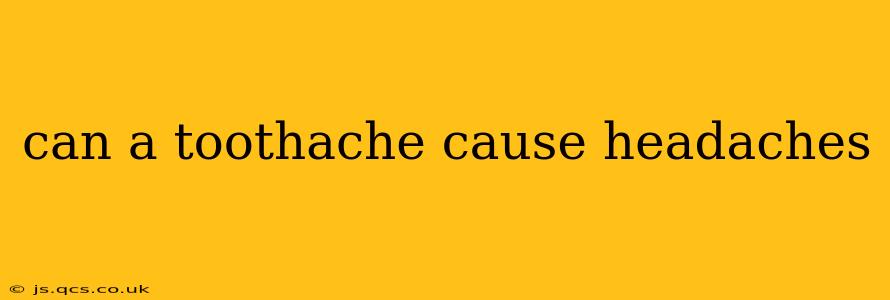Yes, a toothache can absolutely cause headaches. The connection isn't just a coincidence; it's a direct result of the intricate network of nerves and tissues in your head and face. Understanding this connection can help you better manage pain and seek appropriate treatment. This guide explores the relationship between toothaches and headaches, providing answers to common questions and offering valuable insights into effective pain management.
How Does a Toothache Lead to a Headache?
The pain from a toothache doesn't stay localized. The trigeminal nerve, a major cranial nerve, is responsible for sensation in your face, including your teeth, gums, and jaw. When a tooth is infected, inflamed, or experiencing trauma, the trigeminal nerve transmits pain signals to the brain. These signals can be interpreted as pain originating not just in the tooth, but also in the surrounding areas, including the temples, forehead, and even the back of the head. This referred pain is a common phenomenon, where pain felt in one area originates from a different source.
Furthermore, the intense pressure caused by an abscess or other dental issue can directly affect the surrounding tissues and blood vessels, leading to headaches. The body's natural inflammatory response further contributes to the overall discomfort and can exacerbate the headache.
What Type of Headaches Can a Toothache Cause?
A toothache can trigger various types of headaches, most commonly:
- Tension headaches: These are the most common type of headache, characterized by a dull, aching pain that typically surrounds the head. Toothache-induced tension headaches often arise from the jaw muscles tightening in response to the dental pain.
- Sinus headaches: While not always directly caused by a toothache, the proximity of the maxillary sinuses (located near the upper molars) means that severe dental infections can sometimes mimic or worsen sinus headaches. Distinguishing between the two often requires professional assessment.
Can a Toothache Cause Headaches Behind the Eyes?
While less common than headaches in the temples or forehead, a toothache can cause pain behind the eyes. This is particularly true if the problem originates in the upper molars, given the trigeminal nerve's extensive reach. The pain may feel like pressure or a dull ache and could be accompanied by other symptoms like eye fatigue or sensitivity to light.
How to Tell if Your Headache is Caused by a Toothache?
Differentiating between a headache originating from dental issues and other types of headaches requires careful observation. Here are some key indicators suggesting your headache stems from a toothache:
- Localized tooth pain: You experience a persistent and often throbbing pain in a specific tooth.
- Jaw pain or tension: Discomfort in the jaw muscles, often accompanied by stiffness or limited range of motion.
- Sensitivity to temperature: Your teeth are sensitive to hot or cold foods and drinks.
- Facial swelling: Noticeable swelling in the cheek or jaw area.
- Fever: A fever might indicate an infection.
What Should You Do if You Suspect a Toothache is Causing Your Headache?
If you suspect your headache is connected to a toothache, do not attempt to self-diagnose or treat. Schedule an appointment with your dentist as soon as possible. They can accurately diagnose the underlying dental problem and recommend the appropriate treatment, which might include:
- Root canal therapy: To address infections within the tooth's root canal.
- Extraction: If the tooth is beyond repair.
- Antibiotics: To fight infection.
- Pain medication: To manage pain and inflammation.
Ignoring a toothache and hoping the headache will go away is never a good strategy. Dental problems can worsen quickly, leading to more severe pain, infection, and other complications. Prompt professional care is essential for effective pain relief and to prevent more significant health issues.
